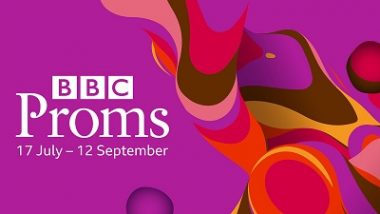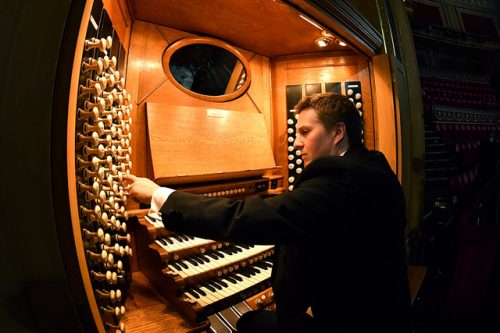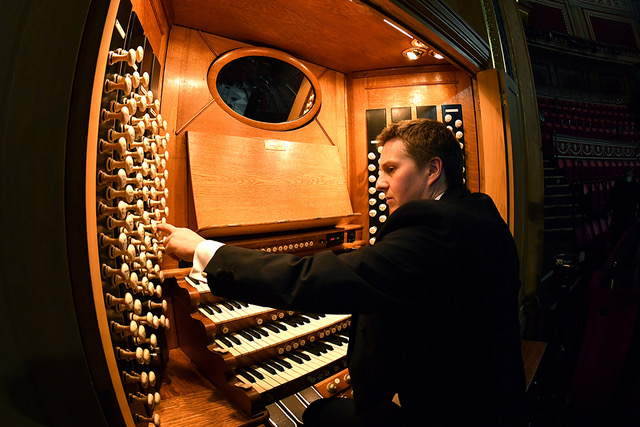
 United Kingdom BBC Proms Live – Rossini, Mascagni, Dukas, Saint-Saëns: Jonathan Scott (organ), Royal Albert Hall, London, Broadcast on BBC Radio 3 and BBC iPlayer, 29.8.2020. (RP)
United Kingdom BBC Proms Live – Rossini, Mascagni, Dukas, Saint-Saëns: Jonathan Scott (organ), Royal Albert Hall, London, Broadcast on BBC Radio 3 and BBC iPlayer, 29.8.2020. (RP)

Rossini – Overture from The Thieving Magpie, arr. J. Scott
Mascagni – Intermezzo from Cavalleria Rusticana, arr. J. Scott
Dukas – The Sorcerer’s Apprentice, arr. J. Scott
Saint-Saëns – Symphony No.3 Op.78, arr. J. Scott
The Royal Albert Hall’s massive organ had a moment in the sun at the 2004 Proms when it was shiny and new after a major restoration. When it was built in 1871, the organ was the largest in the world. It’s not even in the top ten anymore, but after the renovation its 147 stops and 9,999 pipes briefly gave it the honor of being the largest in the UK. The magnificent instrument was once again front and center in Jonathan Scott’s recital for the 2020 Proms.
Scott appears in concert and records, often with his brother, pianist Tom Scott. A native of Manchester, Jonathan Scott studied piano and organ at the Royal Northern College of Music, where he now teaches. His lunchtime organ recitals at Manchester’s Bridgewater Hall attract audiences numbering in the hundreds, but for this concert the Royal Albert Hall was empty. Even though organ recitals would seem perfect for a pandemic – they are a solitary pursuit, save for the occasional page turner and piston puller – audiences pose a problem.
Scott is an entertainer in the best sense of the word, and here he presented four of his own transcriptions of orchestral works, of which he has done over 400. This is music ideally suited for the symphonic organ, of which the Royal Albert Hall’s instrument is a classic example.
The symphonic organ had its roots in nineteenth-century Britain, and Henry Willis & Sons, the firm that built the Royal Albert Hall organ, was renowned for its colossal instruments in grand public spaces. A product of the Romantic Age, the symphonic organ brought music to the masses more economically than touring orchestras in the time before there were either recordings or broadcasts. Its sonic splendors included the sounds of orchestral instruments ranging from the tuba to the bass drum. The Royal Albert Hall organ has over 800 pipes in one division devoted solely to imitating the string instruments of the orchestra.
The overture to Rossini’s The Thieving Magpie begins with the roll of the snare drum, which Scott replicated with a grumbling produced by his hands and feet in the lower ranges of the organ. It, the Intermezzo from Mascagni’s Cavalleria Rusticana and Dukas’s The Sorcerer’s Apprentice are regularly programmed by orchestras to showcase the talents of individual players and for the moods which they magically conjure through music. A symphonic organ is more than equal to the task of replicating those sounds.
Scott’s imaginative transcriptions are tailor-made for his combination of brilliant technique and sense of drama. If anything, the surround-sound reverberations that he created in The Sorcerer’s Apprentice intensified the musical magic. Even in a streamed performance, the rumbling of the 64- and 32-foot stops made an impact.
Saint-Saëns, also an organist, took part in the series of recitals that inaugurated the hall in July 1871 on this same instrument. He played a transcription of the Church Scene from Gounod’s Faust which was described by one reviewer as ‘most marvelous’. The same could be said for Scott’s transcription and performance of the French composer’s most famous work, his Symphony No.3, which was commissioned by the Royal Philharmonic Society and given its first performance in London in 1886.
Scott’s transcription of the symphony was a masterful combination of imagination, ingenuity and musicianship. Re-creating the complexities of the sounds of organ and orchestra demanded remarkable technique and dexterity. At times, Scott was playing up to seven parts simultaneously and utilizing all of the organ’s four keyboards at once, as well as doing the fancy footwork required for double pedaling.
The encore was the people’s choice, with Elgar’s ‘Nimrod’ from the Enigma Variations beating out ‘Largo al factotum’ from Rossini’s The Barber of Seville and the waltz from Tchaikovsky’s The Sleeping Beauty. It is a stately work, often heard at funerals, memorial services and other solemn occasions, reflective of the pensive mood in this most unusual summer.
Rick Perdian
This concert is available if you click here. All of the 2020 Proms concerts can be accessed on BBC Sounds or watched on BBC iPlayer until Monday 12 October.

Truly stunning recital played by a world renowned talent on one of the great organs of the world! Unfortunately the organ sounds it’s best when the hall is empty, so it’s the good side of no audience in person. Bravo to Maestro Scott and his fabulous organ skills!